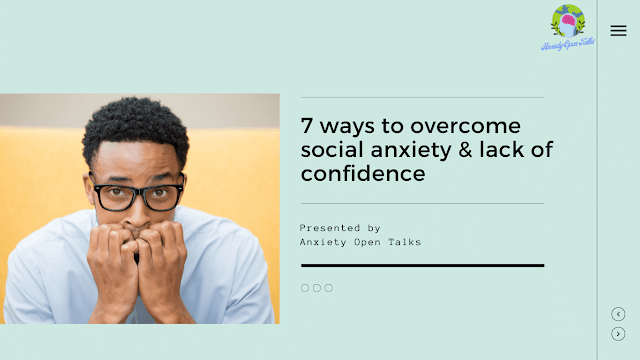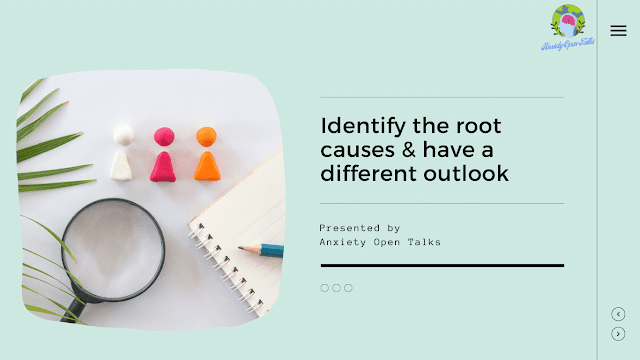There are a few things you can do to overcome social anxiety & lack of confidence, as well as increase your enjoyment of events that you may have once feared.
7 ways to overcome social anxiety & lack of confidence
1. Determine the fundamental cause of the problem.
Talk to an expert or someone you can rely on about the possible causes of these problems and get their opinion.
Have you experienced a string of unfortunate events, and as a result, do you feel as thougheveryone is watching you and thinking something unkind?
Even if they did, you might make someone laugh, and then they'll go back toworrying about the other things that cause stress in their lives - you're not that important,
for better or for worse.
Try looking at things through a more realistic lens and see if it helps make things plain to you.
Your thoughts directly influence the story you tell about yourself.
2. Become familiar with your "Safety Behaviours"
When you start to make up excuses not to attend any social events, you may want to
ask yourself why you are doing so. We have all used lame reasons to get out of doing things
with people that we normally love to see for various reasons.
You may want to ask yourself why you are doing so.
When you have a better understanding of what you do and why you might be doing it,
you will be able to take efforts to reduce the fear response you have
when confronted with anything that causes anxiety.
You might accomplish this in a few different ways, including the following:
Exposure therapy involves either making the effort to get together with a buddy or going to an exercise session with a group.
Instruction in interpersonal and communicative skills.
Therapies based on psychological, cognitive, and behavioral principles
3. Take a few long, slow breaths.
Because of your worries, if you feel that you are more of a physical person and
if you experience shaking, sweating, or an increased heart rate, you may be going through uptake in your sympathetic nervous system.
This indicates that your body is preparing to tackle whatever threat it is experiencing, and as a result, it turns you into a shivering, sweating mess, which is not very enjoyable.
Take a moment to calm down by taking a few deep breaths and counting to three. After that, let a few breaths out. Repeat the previous phrase for one minute, and then notice how differently you feel.
This simple action stimulates your body's parasympathetic nerve system, sometimes known as the "rest and digest" system, which will slow down your beating heart.
You don't need to do much more than just sit there and focus on your breathing in order to practice mindfulness; all you need to do is give yourself a break and give it a try.
📑 Related Reading: How can I help my cat with social anxiety?
4. Get some practice with some fundamental skills.
It's possible that some people who struggle with social phobia or anxiety feel this way because of gaps in their own social skills.
Eye contact (but obviously not staring people down), smiling when greeting others, using an appropriate tone of voice for the situation, appropriately regulating emotions depending on the situation, and expressing choices if necessary are all examples of social skills. Eye contact is one of the most important aspects of social skills.
5. Get plenty of experience speaking in front of an audience.
Finding ways to practice public speaking is a useful strategy for those who have a mild-to-moderate social anxiety disorder. It's not causing you to have panic attacks. Therefore it's important to look for opportunities to do so.
Dr. Potter recommends joining a group such as Toastmasters, which is designed solely for the purpose of developing one's public speaking skills and conducting rehearsals.
6. Consider making use of cognitive behavioral treatment.
Social anxiety can be treated with cognitive behavioral therapy, which involves changing your thoughts and feelings about a situation in order to improve your behavior. There are many different types of psychotherapy available, but cognitive behavioral therapy is one of the most helpful approaches.
“You should teach them how to confront such expectations and how to change their negative self-talk into more positive self-talk”, says Dr.Potter.
7. Put yourself in circumstances that you know would cause you to worry.
Dr. Potter advocates for a practice that she refers to as "situational exposure." Identify the kind of social settings that make you feel anxious and work your way up in difficulty, starting with the easiest and progressing to the most challenging as you practice relaxation techniques to build up your ability to cope with anxiety.
"This will help you overcome your fear of large groups."
The next step is to work up to going out with a more intimate group of pals.
"Work your way up to it."
Repeat as necessary until you reach a point where you feel more at ease before venturing out to a place with a larger number of people, such as a restaurant, a bar, or a party.
According to Dr. Potter, another option for working on situational exposure is to do so with the assistance of a therapist. Exposure therapy, along with cognitive behavioral therapy, is a form of treatment that can be administered by a qualified psychologist.
Ways to overcome social anxiety: Conclusion
You may want to consider medication, psychotherapy, or a mix of the two if you suffer from panic attacks whenever you are in a public setting due to the fact that you feel so overwhelmed.
A different therapeutic approach might work better for persons whose anxiety is not as intense. You can conquer your fear of public speaking and your lack of self-confidence by following these above suggestions.




